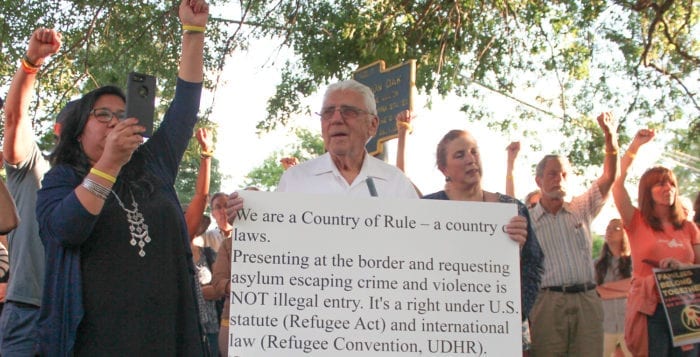Your Turn: Time for solutions to immigration divisions

Why do we have to relearn lessons over and over, despite history telling us what works? Take immigration, the fiery topic du jour. Everyone holds a strong, increasingly entrenched, unmovable opinion about how to stem illegal immigration, protect America’s moral and historic immigrant commitment, preserve moral fiber and do right by those brought to the United States illegally as children. But what is the right answer?
The right answer is a default to common sense. Go back just over 30 years. Former Republican President Ronald Reagan and former Democrat U.S. House Speaker Tip O’Neill found room for agreement, in their time, on this contentious topic. The former “Gang of Eight,” including late Sen. John McCain (R), got close with a bill that passed the Senate, lost in a Republican House. So why can’t we?
America is — by definition and moral conviction — a country founded on immigration, with legal limits for various countries, practices, protocols and a complex fabric of legal obligations tied to those seeking asylum, refugee status, or wishing otherwise to enter and live in the United States, make a better life for themselves, and aspire to citizenship.
Perhaps, oddly in a time of constant recrimination, instant outrage and emotional appeals for walls and sanctuary cities, my view is that there are still compromises available. They should be patiently sought, brought to the public for buy in, feedback and persuasion, then turned into law, just the way Reagan and O’Neill got to the “80 percent solution” more than three decades ago.
The real question is not whether we should build cement or electronic barriers along parts of our southern border, whether we should return criminals to host countries, whether to protect young lives at our border and act humanely, whether to protect our sovereignty, territorial integrity, national security and the sanctity of citizenship. These are false choices.
Of course, we should uphold standing American laws, create effective deterrence to keep illegal gangs, drug and human traffickers from entering the United States, while loving children as children and trying to preserve family units. We should be humane, even to those who may later be deported, because Americans are human by nature, history and character. We should all want to protect our established communities, as well as our national security, ideals and the value of citizenship.
Oversimplifying this important discussion for political points — on either side of the aisle — is disingenuous and disserves average Americans. To fight a pitched battle, casting the other side as favoring illegality, inhumanity, lack of security or opposition to citizenship, are cheap shots.
One has to ask, in all seriousness: Would Reagan or O’Neill cast this debate as so black and white, so simple, stark and impossible to solve? History suggests that they would not do what we are doing, turning on each other and attacking for political gain. They offered a better way forward, and we ought to take it.
Here are basics on which all Americans — including those in Congress — should be able to agree: The nation’s borders are legal, real and should be protected. All lives are valuable, both American and non-American. The disparity between life in the United States and life in many countries south of the border is economically, politically and morally great. The status quo, with thousands crossing into the U.S. illegally, is unsustainable.
But here is another reality: Hardworking adults and students who arrived in the United States as children — i.e., less than one-third of 1 percent of our population — did not commit acts of immoral or illegal behavior. Accordingly, they should not be punished as if they had done so.
What does all this mean? It should be obvious. Congressional leaders and the White House should “beat swords into plowshares,” as Isaiah writes. The compromise to put this divisive issue behind us has four parts:
1. A thoughtful, well-reasoned and empirically supported set of disincentives and barriers that create credible deterrence to illegal entry on our southwest border.
2. A humane, moral and kind approach to those fleeing horrific human conditions to gain asylum or refugee status, including children and adults.
3. Accountable, targeted and effective foreign assistance programs aimed at restoring rule of law, basic stability and self-sufficiency to countries racked by the opposite across this hemisphere, Central America to Venezuela — our neglect in this area has been objectively astronomical.
4. The foresight to understand that these three elements require robust funding, in order to prevent a run on America, for the stability, safety and opportunities we enjoy that many in this hemisphere do not.
As a successful second-generation immigrant, proud American and hardworking businessman, I see opportunities in the present divide to find a new kind of interparty peace, to get to a new place in America where we all accept that compromise is better than pitched battles that lead nowhere.
More to the point, I appreciate what America has meant to me, to my family, to my neighbors. I believe we have a moral duty to find solutions, not just shout and joust, staking out patches of ground to defend, when our real purpose is to defend what it means to be good Americans.
Perry Gershon is a former Congressional candidate for New York’s 1st District and is running again for the same office. He holds a bachelor’s degree from Yale and a master’s in business administration from the University of California. He is also a national commentator on business, trade, policy and politics.






